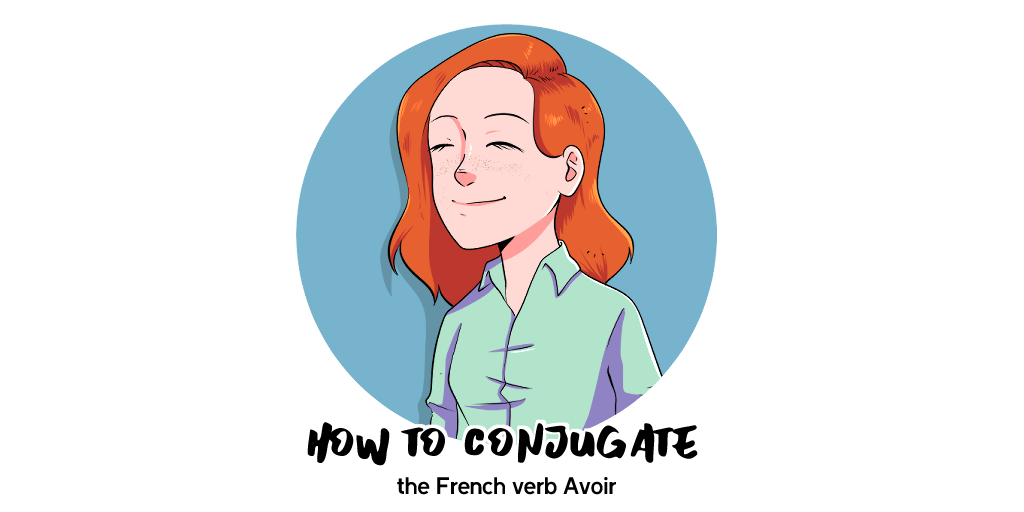Have you ever tried to conjugate avoir as you would an ordinary -ir verb? Below are the ways to conjugate the verb without getting confused with the rules for regular -ir verbs.

Definition and Background Information on Avoir
Avoir means “to have” in French. One very common use of the verb is when answering the question of how old are you. This is because when speaking of your age in French, you say how many years you have.
In this example, “I am 27 years old” becomes J’ai vingt-sept ans. Ai being the conjugated version of avoir in the present tense.
As mentioned above, avoir doesn’t follow the same rules as other -ir verbs when it is being conjugated. This can cause a lot of confusion because it is one of the most commonly used verbs in French.
This verb is also used to conjugate other verbs in certain tenses, for example, the passé composé. This is because it is used to say that someone has done something.
Present Tense French Avoir Conjugation Chart
This is the tense that will be most helpful to learn because it is the tense that will also help you to speak in the passé composé tense in conjunction with other verbs.
| Subject Pronoun | Avoir | English |
|---|---|---|
| J’ | Ai | I have |
| Tu | As | You have |
| Il/Elle | A | He/she has |
| Nous | Avons | We have |
| Vous | Avez | You have |
| Ils/Elles | Ont | They have |
As is the rule, when je is followed by a vowel, it becomes j’ which is what has happened for the first person in the present tense conjugation of avoir.
Examples
- J’ai vingt-sept ans - (I am 27 years old)
- Avez-vous la mission? - (Do you have the assignment?)
Avoir French Conjugation Imperfect Tense
The imperfect tense is a commonly used past tense, in this case being used to say that someone had something.
| Subject Pronoun | Avoir | English |
|---|---|---|
| J’ | Avais | I had |
| Tu | Avais | You had |
| Il/Elle | Avait | He/she had |
| Nous | Avions | We had |
| Vous | Aviez | You had |
| Ils/Elles | Avaient | They had |
Examples
- Ils avaient un bon moment - (They had a great time)
- Elle avait le même vélo quand elle avait ton âge - (She had that same bike when she was your age)
French Avoir Conjugation Future Tense
The future conjugation of avoir in French can be used to say that someone or something will have something in the future.
| Subject Pronoun | Avoir | English |
|---|---|---|
| J’ | Aurai | I will have |
| Tu | Auras | You will have |
| Il/Elle | Aura | He/she will have |
| Nous | Aurons | We will have |
| Vous | Aurez | You will have |
| Ils/Elles | Auront | They will have |
Examples
- Vous aurez une bonne carrière - (You will have a good career)
- Nous aurons une fête quand tu auras fini - (We will have a party when you finish)
French Conjugation of Avoir in the Conditional Tense
The conditional tense is another future tense conjugation of avoir. It can be used to say that someone will have something in the future if it isn’t certain.
| Subject Pronoun | Avoir | English |
|---|---|---|
| J’ | Aurais | I will have |
| Tu | Aurais | You will have |
| Il/Elle | Aurait | He/she will have |
| Nous | Aurions | We will have |
| Vous | Auriez | You will have |
| Ils/Elles | Auraient | They will have |
Example
- j'aurais peut-être été - (I might have been)
Passé Composé Conjugation of Avoir in French
As explained earlier, avoir is used as an auxiliary verb for other French verbs in this tense. For the passé composé tense of avoir, it needs to be conjugated twice in a sense.
Firstly, you will use the present tense of avoir, as is shown in the table above, then use it in conjunction with the past participle of the verb (eu).
| Subject Pronoun | Avoir | English |
|---|---|---|
| J’ | Ai eu | I have had |
| Tu | As eu | You have had |
| Il/Elle | A eu | He/she has had |
| Nous | Avons eu | We have had |
| Vous | Avez eu | You have had |
| Ils/Elles | Ont eu | They have had |
So, for this tense as long as you have learnt the French conjugation of avoir in the present tense and know that the past participle of the verb is “eu”, you shouldn’t have any issues.
Examples
- Il a eu assez - (He has had enough)
- Tu as eu tout le week-end pour y travailler - (You have had the whole weekend to work on it)
Avoir Subjunctive Tense Conjugation in French
| Subject Pronoun | Avoir | English Pronoun |
|---|---|---|
| J’ | Aie | I |
| Tu | Aies | You |
| Il/Elle | Ait | He/she |
| Nous | Ayons | We |
| Vous | Ayez | You |
| Ils/Elles | Aient | They |
French Verb Conjugation of Avoir in the Pluperfect Tense
The pluperfect tense, or plus-que-parfait, is the English past perfect tense. This means that it is used primarily to explain something that happened before something else.
| Subject Pronoun | Avoir | English Pronoun |
|---|---|---|
| J’ | Avais eu | I |
| Tu | Avais eu | You |
| Il/Elle | Avait eu | He/she |
| Nous | Avions eu | We |
| Vous | Aviez eu | You |
| Ils/Elles | Avaient eu | They |
To conjugate this tense in French, you need to combine the imperfect tense conjugation of avoir and the verb’s past participle.
French Conjugation of Avoir in Le Passé Historique
Also known as La passé simple, this tense is mainly used in writing to describe something that has happened in the past.
| Subject Pronoun | Avoir | English Pronoun |
|---|---|---|
| J’ | Eus | I |
| Tu | Eus | You |
| Il/Elle | Eut | He/she |
| Nous | Eûmes | We |
| Vous | Eûtes | You |
| Ils/Elles | Eurent | They |
Passé Antérieur Avoir Conjugation in French
This tense is also mainly used in formal written French. It is formed by combining le passé simple and the past participle of avoir.
| Subject Pronoun | Avoir | English Pronoun |
|---|---|---|
| J’ | Eus eu | I |
| Tu | Eus eu | You |
| Il/Elle | Eut eu | He/she |
| Nous | Eûmes eu | We |
| Vous | Eûtes eu | You |
| Ils/Elles | Eurent eu | They |
Futur Antérieur Avoir French Conjugation
This tense is used to describe an event that will happen in the future at a certain time.
To conjugate this version of the French verb avoir, you will need to combine the future tense and the past participle.
| Subject Pronoun | Avoir | English Pronoun |
|---|---|---|
| J’ | Aurai eu | I |
| Tu | Auras eu | You |
| Il/Elle | Aura eu | He/she |
| Nous | Aurons eu | We |
| Vous | Aurez eu | You |
| Ils/Elles | Auront eu | They |
The Near Future Tense Conjugation of Avoir in French
The near future tense, or futur proche, is used to discuss something that will definitely happen in the future. This is in contrast to the subjunctive tense, which is conditional.
In this tense, the present conjugation of aller is used in conjunction with the full verb avoir.
| Subject Pronoun | Avoir | English Pronoun |
|---|---|---|
| J’ | Vais avoir | I |
| Tu | Vas avoir | You |
| Il/Elle | Va avoir | He/she |
| Nous | Allons avoir | We |
| Vous | Allez avoir | You |
| Ils/Elles | Vont avoir | They |
Common Phrases Using the Conjugation of Avoir in French
Avoir can be used to say if you want or need something as well. When I was learning to speak French, I was told to think of it as having a need or want for something as it would make it easier to remember that way.
- Avoir besoin de... - (To need something)
- Avoir envie de… - (To want something)
Avoir can also be used to talk about whether you are hungry, thirsty, hot, or cold. Although the verb is only to be used in this way when it is something that you are feeling.
- Avoir faim - (To be hungry)
- Avoir soif - (To be thirsty)
- Avoir froid - (To feel cold)
- Avoir chaud - (To feel hot)
Conclusion
Because avoir is such a commonly used verb in French and doesn’t have the same rules for conjugation as other ir verbs do, it is important that you take the time to learn these conjugations.
Other articles on verb conjugations can be found here:

Magnifique!
Merci !